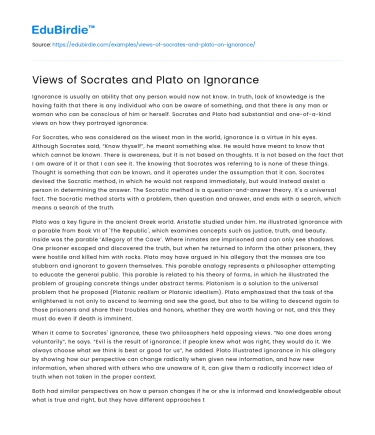Ignorance is usually an ability that any person would now not know. In truth, lack of knowledge is the having faith that there is any individual who can be aware of something, and that there is any man or woman who can be conscious of him or herself. Socrates and Plato had substantial and one-of-a-kind views on how they portrayed ignorance.
For Socrates, who was considered as the wisest man in the world, ignorance is a virtue in his eyes. Although Socrates said, “Know thyself”, he meant something else. He would have meant to know that which cannot be known. There is awareness, but it is not based on thoughts. It is not based on the fact that I am aware of it or that I can see it. The knowing that Socrates was referring to is none of these things. Thought is something that can be known, and it operates under the assumption that it can. Socrates devised the Socratic method, in which he would not respond immediately, but would instead assist a person in determining the answer. The Socratic method is a question-and-answer theory. It's a universal fact. The Socratic method starts with a problem, then question and answer, and ends with a search, which means a search of the truth.
Plato was a key figure in the ancient Greek world. Aristotle studied under him. He illustrated ignorance with a parable from Book VII of 'The Republic', which examines concepts such as justice, truth, and beauty. Inside was the parable ‘Allegory of the Cave’. Where inmates are imprisoned and can only see shadows. One prisoner escaped and discovered the truth, but when he returned to inform the other prisoners, they were hostile and killed him with rocks. Plato may have argued in his allegory that the masses are too stubborn and ignorant to govern themselves. This parable analogy represents a philosopher attempting to educate the general public. This parable is related to his theory of forms, in which he illustrated the problem of grouping concrete things under abstract terms. Platonism is a solution to the universal problem that he proposed (Platonic realism or Platonic idealism). Plato emphasized that the task of the enlightened is not only to ascend to learning and see the good, but also to be willing to descend again to those prisoners and share their troubles and honors, whether they are worth having or not, and this they must do even if death is imminent.
When it came to Socrates' ignorance, these two philosophers held opposing views. “No one does wrong voluntarily”, he says. “Evil is the result of ignorance; if people knew what was right, they would do it. We always choose what we think is best or good for us”, he added. Plato illustrated ignorance in his allegory by showing how our perspective can change radically when given new information, and how new information, when shared with others who are unaware of it, can give them a radically incorrect idea of truth when not taken in the proper context.
Both had similar perspectives on how a person changes if he or she is informed and knowledgeable about what is true and right, but they have different approaches to providing answers and solutions to ignorance.






 Stuck on your essay?
Stuck on your essay?

